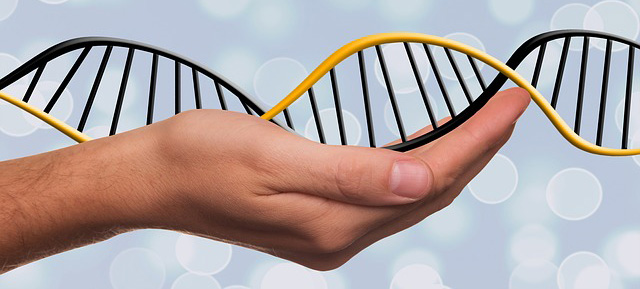
Germline GeneticsFor detecting the genetic conditions at an early stage
Germline Genetics refers to study of genetic changes/mutation that has incorporated into the DNA of every cell in the body of the offspring. A Germline mutation may be passed from parent to offspring. Early detection of Germline mutation can help in detecting the genetic condition at an early stage and can also to plan the future in a prepared manner.
Hereditary Breast and Ovarian Cancer (HBOC)- BRCA1, BRCA2
Germline variations in BRCA1 and BRCA2 account for the vast majority of families with Hereditary Breast and Ovarian Cancer Syndrome (HBOC). The estimated lifetime risk of breast cancer in women with germline variations in the BRCA1
and BRCA2 is 40-70%. The risk of ovarian cancer is 24-40% for a woman with BRCA1 and 11-18% with BRCA2. Men and Women with germline variations in BRCA1/2 and the other genes included above may also be at increased risk of other
cancers, including pancreatic, prostate, melanoma, stomach, esophageal, and bile duct cancers.
We have our NGS panel for testing BRCA1 and BRCA2 mutations, with options for genetic counselling.
| Test Code | Test | Test Details | Sample | TAT (Working days) |
|---|---|---|---|---|
| PSNM222 | HBOC | Hereditary Breast and Ovarian Cancer (HBOC)- BRCA1, BRCA2 | FFPE and Blood (5ml) | 3-4 weeks |
DMD Panel
Duchenne muscular dystrophy (DMD) is a genetic condition that affects the muscles, leading to muscle wasting that gets worse over time. DMD occurs primarily in males, and usually the females are carriers. The symptoms of DMD include progressive weakness and loss (atrophy) of skeletal and heart muscles. It is caused by mutations (alterations) in the genes responsible for muscle structure and function. It usually develops after inheriting a faulty gene from one or both parents in few cases, such genetic mutations can also develop as a new event in the family. A family history of Muscular Dystrophy will increase the chance of affecting an individual.
Our DMD panel detects the deletion of the most common Exons such as 45-51 for diagnosis of DMD.
| Test Code | Test | Test Details | Sample | TAT (Working days) |
|---|---|---|---|---|
| DMD01 | Duchenne muscular dystrophy | Detection of exon deletion for the diagnosis of Duchenne muscular dystrophy | Blood - 5 ml in EDTA tube | 3-4 weeks |
Carrier Screening
Carrier screening is the practice of testing individuals to identify those at increased risks of having children affected by genetic diseases. It is generally done by maternity care and reproductive healthcare providers on pre- and postconceptional reproductive
carrier screening for women or couples who may be at risk of being carriers for autosomal recessive (AR), autosomal dominant (AD), or X-linked (XL) conditions, with risk of transmission to the fetus. Carrier screening should be
done in order to get information about the risk of having a child with a genetic condition. Individuals can be carriers of certain genetic conditions even if they do not have anybody in their family with the condition. If both
partners are found to be carriers then there is
1. 25% risk of having an affected child
2. 50% chance of having a carrier child
3. 25% chance of having an unaffected child and is not a carrier
Our screening test covers around 100/300/3000+ genes corresponding to unique conditions.
| Test Code | Test | Test Details | Sample | TAT (Working days) |
|---|---|---|---|---|
| RPH0319 | Carrier Screening | To identify fetus' risks of having any genetic conditions | Dried blood or saliva | 3-4 weeks |
Clinical Exome Sequencing
Clinical Exome Sequencing (CES) is a molecular analysis technique for identifying disease-causing DNA variants responsible for a medical condition. In CES, thousands of gene changes can be analyzed at the same time. Advised to go for CES if, clinically suspected disease without genetic confirmation, Presence of atypical symptoms and multiple genetic conditions resulting in differential diagnosis, Several clinical tests but no definite diagnosis, Novel gene change. The advantages of doing CES are, Identification of high-risk variants with high accuracy, Screening of multiple genes at the same time, Quick and comprehensive results clinically relevant disease specific information.
| Test Code | Test | Test Details | Sample | TAT (Working days) |
|---|---|---|---|---|
| CES01 | Clinical exome sequencing | For identification of disease-causing DNA variants responsible for a medical condition. | Blood - 5 ml in EDTA tube | 6-8 weeks |
New Born Screening
A new born may appear normal at birth but may have a hidden medical condition. As the child grows, these conditions could later manifest into serious illnesses and affect the growth and life of the child. New-born screening is a simple test that can be performed 48 hours after the baby’s birth to rule out these risks.
- New born screening checks for rare, serious but treatable conditions at birth before they cause irreversible damage to the baby
- Sometimes a baby could have a condition even if there is no family history to it
- Early detection allows early treatment which usually involves a change in diet or medication that can help the baby live a normal life
The New born Screening Test screens the baby for over 50 conditions under
- Haemoglobinopathies – Genetic disorders resulting in faulty haemoglobin. Includes sickle cell disease, Thalassemia and so on.
- Endocrine Disorders – Conditions causing hormonal excesses or deficiencies. Include Hypothyroidism
- Infectious Diseases
- Carbohydrate Disorders – Conditions affecting the metabolism of carbohydrates. Include Lactose Intolerance
- Inborn Errors of Metabolism – Genetic conditions affecting metabolism
| Test Code | Test | Test Details | Sample | TAT (Working days) |
|---|---|---|---|---|
| RPH0316 | New Born screening | The new born screening tests conditions like Hemoglobinopathies, Endocrine Disorders, Infectious diseases, Carbohydrate disorders and Metabolic disorders. | Dried blood or saliva | 3-4 weeks |
